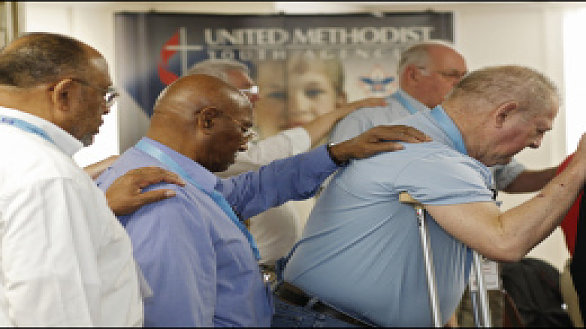Conference presidents of United Methodist Men pray for one of their colleagues during their annual meeting in Nashville. A UMNS photo by Ronny Perry.
NASHVILLE, Tenn. (UMNS)—United Methodist Men want to be known less as a group of retired old men eating out and more as advocates for the hungry.
Marking a new era, the organization has elected a new chief executive, is expanding its hunger ministries and is creating a new online learning center.
The National Association of Conference (regional) Presidents of United Methodist Men, meeting March 3-7 in Nashville, installed Gilbert C. Hanke as the new chief executive officer of the General Commission on United Methodist Men.
Hanke, a speech pathologist who has made 12 mission trips to Haiti, showed the men slides of the destroyed school where he once provided hearing aids. As a part of the installation service, the conference presidents and their prayer advocates presented a $2,000 check to the United Methodist Committee on Relief for Haiti relief in his honor.
The 42 presidents and their 23 prayer advocates also learned about plans to launch an online learning center to provide continuing education experiences for persons interested in men’s ministry, scouting, prayer and anti-hunger activities.
The commission has already developed a 12-hour, 16-segment training course titled "Understanding Men's Ministry." The course is based upon the content and materials used in the No-Man-Left-Behind training offered by Orlando, Fla.-based Man in the Mirror.
New executive
Hanke told the presidents that they should expect him to strive for a Wesleyan balance between work and family and between spiritual holiness and social holiness. He said he would begin each day reading the Bible and the “Upper Room Disciplines” as he sets plans to work in local mission projects and will go to Haiti to aid rebuilding efforts as soon as the Texas Conference is cleared to go.
He also promised the men he would continue his involvement with a small accountability group and will make an annual pledge to support United Methodist Men ministries.
He noted that the commission has provided members of the Armed Forces with 420,000 free copies of “Strength for Service to God and Country,” a revised World War II book published by the United Methodist Publishing House. “I carry a book every time I travel,” he said. “God usually makes His plan plain to me as to who I give it to.
“I will be open to any new adventure God has prepared for us,” he concluded as he invited the presidents and prayer advocates to make similar commitments.
(view Gil Hanke's installation address.)
Anti-hunger battle lines extended
Over the past 12 years, United Methodist Men have given $2.3 million to anti-hunger efforts led by the Society of St. Andrew, an agency based in Big Island, Va. Funds collected by the men provided 176.8 million meal servings.
In addition, hunger relief advocates related to United Methodist Men led over 50,000 volunteers in more than 4,000 gleaning efforts to provide 19.7 million pounds of produce donated to 11,306 critical feeding agencies.
As part of a long tradition, Wade Mays, a staff executive with the Society of St. Andrew, presented a “Bud-the-Spud Award” to the men of Detroit Conference for leading the nation in giving to Meals for Millions. The award honors the late Nelson L. “Bud” Curtis, who donned a potato costume to urge men to participate in “potato drops” where thousands of potatoes are bagged for food pantries.
Participants at the March meeting also agreed to help Stop Hunger Now, based in Raleigh, N.C., provide 13-ounce packages of nutritious dried food for hungry families throughout the world and were encouraged to host food-packaging events.
Larry Malone, a staff executive with the General Commission on United Methodist Men and president of the men’s affiliate with the World Methodist Council, recently invited Korean Methodist Men to establish a warehouse in South Korea to distribute food packets to North Korea and other nations in Asia.
“Stop Hunger Now allows us to address hunger internationally and complements our long-standing relationship with the Society of St. Andrew,” said Malone. “With the two, we’re able to extend hunger relief around the world.”
Online learning center
United Methodist men may soon be able to walk to their home or office computer instead of boarding an airplane and booking a hotel for expensive training in men’s ministry.
The presidents learned about the proposed creation of a Web-based “Leader Learning & Development Center” where participants can improve their skills as local, district and annual conference leaders. Two courses, the “History and Polity of The United Methodist Church,” and “Safe Sanctuary and Sexual Ethics,” are already online with the “Understanding Men’s Ministry” course.
Neil Brown, one of the architects of the learning center, said participants would be able to major and minor in subject areas. Upon completion of specific leader tracks, they will receive certification papers. “We hope to find a financial sponsor for the entire center,” he added. “Other agencies and individuals will be able to sponsor particular courses.”
Twenty-five participants in a December webinar tested the concept of the online learning center. When it is complete, it will be available 24 hours a day for self-paced learning at the commission’s Web site (www.gcumm.org).
By J. Richard Peck, a retired clergy member of New York Annual Conference and communications coordinator for the General Commission on United Methodist Men.
News media contact: Linda Bloom, New York, (646) 369-3759 or newsdesk@umcom.org.


